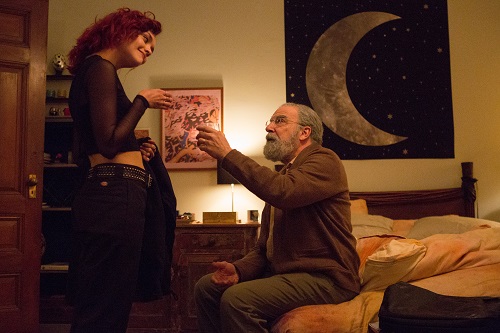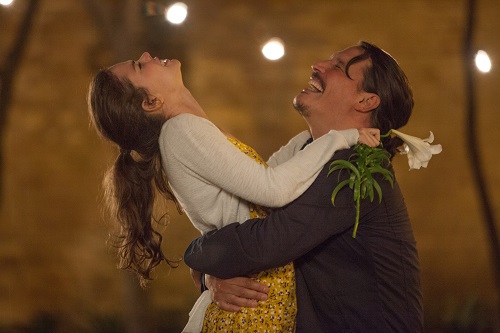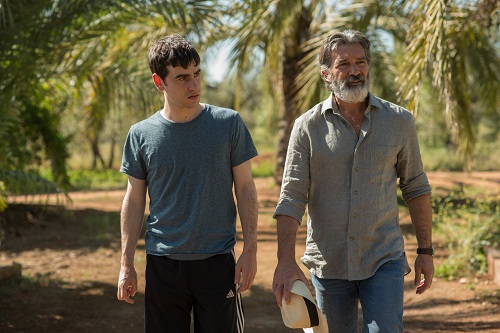

Review, With Hella Spoilers: 'Life Itself' is This Year's 'Book of Henry,' Another Misguided Attempt at Enraging Melodrama
By Roxana Hadadi | Film | September 21, 2018 |
By Roxana Hadadi | Film | September 21, 2018 |

Hello! I’m an unreliable narrator! Do you know what that means? Can you go all the way back to middle or high school English to remember? It means that I could be telling the truth or I could be lying. I could be recounting things accurately or I could be putting my own bias and spin on it. You can’t rely on what I’m going to say! It’s wild! It’s like … life itself!
… That shit right there? That is the whole plot of Life Itself, the latest film from This Is Us creator Dan Fogelman. This is Fogelman’s The Book of Henry, the movie that made us all realize, “Ugh, Colin Trevorrow, NO.” Fogelman applies all of his most melodramatic twists and turns to Life Itself, all of his attempts at making us cry and wail and sob, and I — the person who cried at that Nike ad, at every single A Star is Born trailer, and whenever I even think about The Namesake — was utterly unmoved. Not one tear, motherfuckers! And that’s because I was too busy being enraged at the goddamn mess of this film.
Let’s just go DEEP into spoiler territory here. If you want to read a spoiler-free review of Life Itself, EVACUATE THE PREMISES. I CANNOT HELP YOU. I can only share the insanity.
Fogelman divides the film into various “chapters,” one through five, and uses them to toy with his idea of life being an unreliable narrator. You never know what’s coming, you never know what’s next, and this is all treated like some grand philosophical idea when it’s just … you know, living. Yet from the beginning through the end of the film, Fogelman clings to this idea like it’s something thoroughly unique and profound; he even has Oscar Isaac’s character solemnly tell his therapist, played by Annette Bening, “This is really some deep philosophical shit we’re talking about here.” [Insert Rihanna rolling up car window.gif; that’s how I feel reliving that line of dialogue. Ugh.]
Anyway! So right, those chapters — the first focuses on the relationship between Isaac’s Will and the love of his life, Olivia Wilde’s Abby, who is pregnant with their first child. When we meet Will, he’s disgruntled and desperate, pouring whiskey into his coffee and frustrated by a failed screenplay he wrote that was narrated by Samuel L. Jackson (yes, the movie actually begins with Jackson narrating this terrible film idea), and we learn that he and Abby were happy together, fell in love in college, bonded over Bob Dylan (exasperated sigh) and Quentin Tarantino (double exasperated sigh), and she was his perfect manic pixie dream girl, and he threatened to kill himself if she didn’t accept his proposal, and then they got married and got pregnant and were going to name their daughter Dylan and then Olivia got hit by a bus and died.
HIT BY A BUS. AND DIED. We see blood all over the pavement and it’s all grotesque and unnecessarily macabre because FEELINGS, and then we realize that Will doesn’t want to live anymore, either, and he shoots himself in the head in his therapist’s office. Because FEELINGS.

Cue the next chapter! Which is about their daughter, Dylan, who grows up to be Olivia Cooke with Manic Panic hair and a rose tattoo behind her ear and she hates Bob Dylan, tearing up a poster in her room and resenting her parents for dying and performing in a shitty punk band and eating peanut butter and jelly sandwiches, just like her grandmother used to, because of genetics and history and familial lineage. She imagines the accident that killed her mother over and over again, and although she never says anything as absurd as Abby telling Will when he professed his feelings for her that “I may not be equipped to be loved this much” (barf), she does push away her grandfather played by Mandy Patinkin at every opportunity. He wants her to go to college, he’s worried about her smoking and drinking, but Dylan can’t be consoled. Her life is one shaped by tragedy and despair, and she’s wallowing in it.

But what if … wait for it … what if Dylan fell in love? Wouldn’t that solve all of her problems? And so Life Itself moves into Chapters 4 and 5, which move the setting of the film from New York City to Andalusia, Spain, where olive farm foreman Javier (Sergio Peris-Mencheta) is a good man, someone who isn’t swayed by olive farm owner Mr. Saccione’s (Antonio Banderas) wealth. He just wants to live a simple life with his wife Bella (Laia Costa) and their son Rodrigo (Adrian Marrero), but a trip to New York City derails their lives when Rodrigo’s cuteness distracted the bus driver who then killed Abby. What a twist! Convinced that Mr. Saccione will provide better for his family than he can, Javier abandons them, and Rodrigo grows up to attend college at New York University at the encouragement of his mother, who is now dying from cancer, and who switches over to English to give him an inspirational speech about living his life and finding love despite the pain.
Yes. Bella switches over to English, not her native language, to give this lengthy monologue, and I’m sure it’s because the filmmakers didn’t think people would read everything she had to say in subtitles if she said it in Spanish. So that’s my cynical take on that shit.
You know where this is going. Rodrigo goes to New York City. Dylan is also in New York City. They fall in love. They realize each other’s histories. And they have a daughter, Elena (Lorenza Izzo), who in Chapter 5 writes their story and is sharing it at a book reading event. This is like, 60 years in the future at this point. Are we really pretending physical bookstores will still exist in six decades from now? REALLY?

Is that the most outlandish part of Life Itself? Possibly. But this is a film full of the kind of “coincidences” that are actually sloppy writing, faux-impactful moments that are meant to move you to tears because of how awful they are, not because of how invested you are in the characters. A mother dying of cancer is objectively sad. A mother being hit by a bus and dying is objectively sad. But the movie spends such little time with Abby and with Bella that these deaths don’t register as meaningful for us; they’re only sad because they make the male protagonists sad. And for a movie that claims to care so much about unreliable narrators, and that tries to say that maybe these manic pixie dream girls weren’t really manic pixie dream girls because we’re just seeing the male perspective, there’s still too little here to actually feel like this is a story about both men and women. No. Much like The Book of Henry, this is a story about men thinking they’re heroes, about being selfless and courageous and brave, and the women that they convince into loving them.
At one point Will says to Abby that he loves her like a stalker, as if that’s a good thing; later on, Javier says to Elena that he’s abandoning her and Rodrigo because he loves them too much. Sorry, but I’m not crying over that; I’m not spilling tears over men who are presented as heroes when they’re really cowards. I don’t have the energy for that shit. Putting aside everything else wrong with Life Itself — an overreliance on flashbacks to sketch out characters; dialogue that feels like a first draft; and ugh, why so much love for Bob Dylan? — the movie’s attempt to pretend it’s anything other than another piece of “Nice men have feelings too, love us for being so nice!” propaganda is just exhausting.
← Dan Fogelman of 'Life Itself' Isn't Wrong on Film Criticism Being White and Male But He's Not Right Either | The Republican Party Is Just Rotten to the Goddamn Core →
More Like This
'The Gentlemen' Review: Ritchie's Latest Episodic Caper is a Blast for Fans of his Formula
Kristen Stewart's 'Love Lies Bleeding' Is Gonna Kick Your Ass And Make You Beg For More
What the Hell Is Going On in Apple TV+'s 'Constellation'?
‘Shōgun’ is TV’s Next Big Epic
It's Not the Filmmakers' Fault that Bill Belichick Sucks in 'The Dynasty: New England Patriots'

What’s Old Is New Again: Old Hollywood Glamour Glitters at the 2024 Oscars
Al Pacino Presents Best Picture Oscar, Confuses Everyone
The Dangerous Lie Of 'TradWives'
A Legendary Horror Franchise Is Headed To Television
'The Mandalorian' Season 4 Is Probably Not Happening
Halle Bailey On Why She Chose To Keep Her Pregnancy Private
More Like This
'The Gentlemen' Review: Ritchie's Latest Episodic Caper is a Blast for Fans of his Formula
Kristen Stewart's 'Love Lies Bleeding' Is Gonna Kick Your Ass And Make You Beg For More
What the Hell Is Going On in Apple TV+'s 'Constellation'?
‘Shōgun’ is TV’s Next Big Epic
It's Not the Filmmakers' Fault that Bill Belichick Sucks in 'The Dynasty: New England Patriots'
Reviews